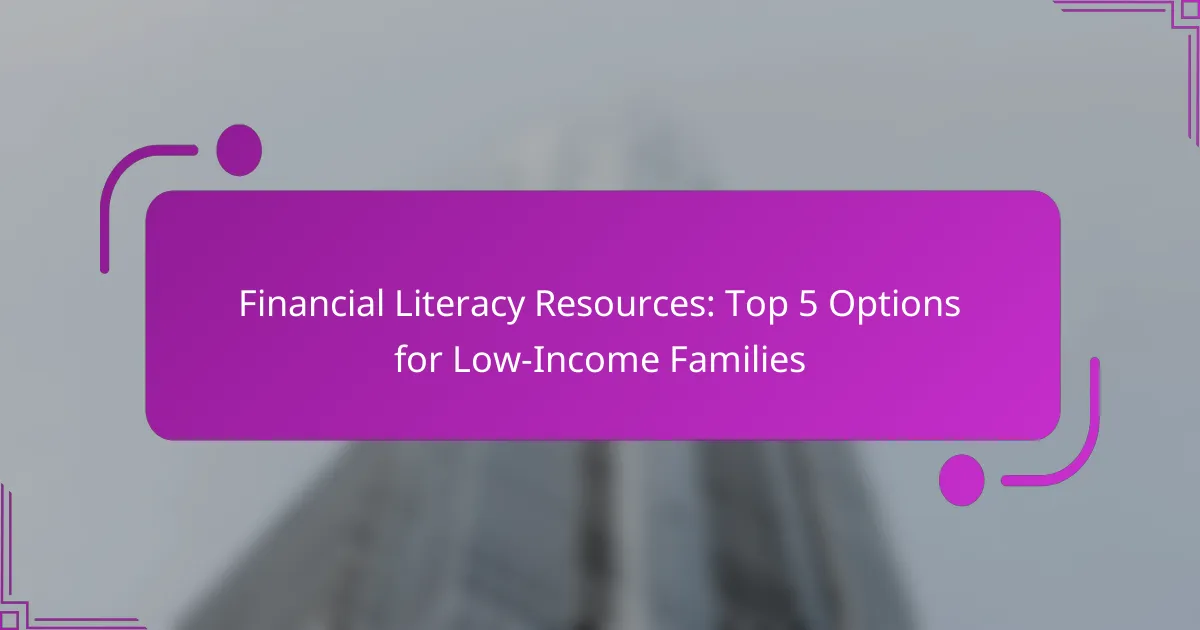Financial literacy is essential for seniors, as it empowers them to make informed decisions regarding their retirement planning. By understanding key financial concepts, seniors can effectively manage their resources and maintain their desired lifestyle throughout retirement.

Why is financial literacy important for retirement planning in seniors?
Financial literacy is crucial for seniors as it equips them with the knowledge and skills necessary to make informed decisions about their retirement planning. Understanding financial concepts helps seniors manage their resources effectively, ensuring they can maintain their desired lifestyle during retirement.
Enhances decision-making skills
Improved financial literacy enables seniors to make better decisions regarding investments, savings, and spending. By understanding various financial products and market conditions, seniors can evaluate options more critically, leading to choices that align with their retirement goals.
For example, a senior who understands the difference between fixed and variable annuities can select the product that best suits their income needs. This knowledge can significantly impact their financial stability in retirement.
Improves financial security
Financial literacy directly contributes to enhanced financial security for seniors. By grasping budgeting techniques and investment strategies, seniors can create a sustainable financial plan that minimizes risks and maximizes returns.
Establishing an emergency fund, understanding Social Security benefits, and knowing how to manage debt are all aspects of financial literacy that can lead to a more secure retirement. Seniors who are financially literate are better prepared to handle unexpected expenses without jeopardizing their retirement savings.
Reduces anxiety about retirement
Being financially literate can significantly reduce anxiety related to retirement. When seniors understand their financial situation and have a clear plan, they are less likely to worry about running out of money or facing financial hardships.
Creating a comprehensive retirement plan that includes income sources, expenses, and savings goals can alleviate fears. Regularly reviewing and adjusting this plan as needed ensures seniors remain confident in their financial future.

What financial literacy resources are available for seniors?
Seniors have access to various financial literacy resources designed to enhance their understanding of personal finance, especially for retirement planning. These resources include online courses, community workshops, and informative books tailored to their specific needs.
Online courses from AARP
AARP offers a range of online courses focused on financial literacy for seniors. These courses cover topics such as budgeting, investing, and retirement planning, allowing seniors to learn at their own pace. Many of these courses are free or available at a low cost, making them accessible to a wide audience.
Participants can engage with interactive materials and quizzes to reinforce their understanding. AARP’s platform also provides resources for further reading and tools to help seniors apply what they’ve learned to their financial situations.
Workshops by local community centers
Local community centers often host workshops aimed at improving financial literacy among seniors. These workshops typically feature expert speakers who provide practical advice on managing finances, understanding Social Security benefits, and planning for healthcare costs in retirement.
Attending these workshops not only offers valuable information but also creates opportunities for seniors to connect with peers facing similar financial challenges. Many community centers offer these sessions for free or at a nominal fee, making them an affordable option for learning.
Books on personal finance for seniors
Numerous books on personal finance cater specifically to seniors, addressing their unique financial situations and concerns. Titles often cover essential topics such as retirement savings, estate planning, and managing healthcare expenses. Popular books include “The Total Money Makeover” and “The Retirement Survival Guide.”
When selecting a book, seniors should look for those that provide clear, actionable advice and are written in an accessible style. Many libraries offer these books for free, allowing seniors to explore various options without financial commitment.

How can seniors improve their financial literacy?
Seniors can enhance their financial literacy by actively engaging in educational resources, seeking professional advice, and utilizing budgeting tools. These strategies help them make informed decisions about their retirement finances and ensure a stable financial future.
Participate in financial education programs
Financial education programs offer valuable information tailored to seniors, covering topics like retirement planning, investment strategies, and managing expenses. Many community centers, libraries, and online platforms provide free or low-cost workshops and courses.
Look for programs that are specifically designed for older adults, as they often address unique challenges such as healthcare costs and social security benefits. Participating in these programs can significantly boost confidence in managing personal finances.
Consult with financial advisors
Working with a financial advisor can provide personalized guidance tailored to individual retirement goals. Advisors can help seniors navigate complex financial products, assess risk tolerance, and create a comprehensive retirement plan.
When choosing an advisor, consider their experience with senior clients and their fee structure. Some advisors charge a flat fee, while others earn commissions on products sold. It’s essential to understand these costs to avoid unexpected expenses.
Utilize budgeting tools like Mint
Budgeting tools like Mint can help seniors track their income and expenses, making it easier to manage finances effectively. These tools provide insights into spending habits and can alert users to overspending in specific categories.
Using a budgeting app can simplify financial management by consolidating all accounts in one place. Seniors should regularly review their budgets and adjust as necessary to stay on track with their financial goals, especially during retirement when income may be fixed.

What role do government programs play in financial literacy?
Government programs are crucial in enhancing financial literacy, particularly for seniors planning for retirement. These programs provide essential resources and information that help individuals understand their financial options and make informed decisions about their retirement savings and healthcare costs.
Social Security Administration resources
The Social Security Administration (SSA) offers various resources to assist seniors in understanding their benefits and financial planning. Seniors can access online tools that estimate their monthly benefits based on their earnings history, which helps in budgeting for retirement.
Additionally, the SSA provides educational materials and workshops that cover topics such as when to claim benefits and how to maximize them. Utilizing these resources can significantly impact a senior’s financial stability during retirement.
Medicare financial planning assistance
Medicare offers financial planning assistance that is vital for seniors navigating healthcare costs in retirement. Understanding the different parts of Medicare—A, B, C, and D—can help seniors make informed choices about their coverage and associated expenses.
Seniors can access resources like the Medicare website, which provides calculators for estimating out-of-pocket costs and information on supplemental insurance options. Engaging with these tools ensures that seniors are prepared for potential healthcare expenses, which can be a significant part of their retirement budget.

How to choose the right financial advisor for retirement?
Choosing the right financial advisor for retirement involves assessing their qualifications, experience, and fee structures. A suitable advisor should align with your financial goals and provide clear guidance tailored to your retirement needs.
Check credentials and experience
Start by verifying the advisor’s credentials, such as certifications like Certified Financial Planner (CFP) or Chartered Financial Analyst (CFA). These designations indicate a level of expertise and commitment to ethical standards.
Experience is equally important; look for advisors who have worked with clients in similar financial situations. Ask about their track record in retirement planning, including how they have helped clients achieve their retirement goals.
Evaluate fee structures
Understanding an advisor’s fee structure is crucial to ensure it fits your budget. Common fee arrangements include hourly rates, flat fees, or a percentage of assets under management, typically ranging from 0.5% to 1% annually.
Be cautious of hidden fees that may arise from investment products or commissions. Always request a clear breakdown of all costs involved to avoid surprises that could impact your retirement savings.

What are common financial pitfalls for seniors?
Seniors often face several financial pitfalls that can jeopardize their retirement savings and overall financial health. Key issues include underestimating healthcare costs, overspending on lifestyle choices, and failing to plan for inflation.
Underestimating healthcare costs
Healthcare expenses can significantly impact a senior’s budget, often exceeding initial estimates. Many seniors may not account for long-term care or unexpected medical emergencies, which can lead to financial strain. It’s crucial to research and plan for potential healthcare costs, including premiums, deductibles, and out-of-pocket expenses.
Overspending on lifestyle choices
As seniors transition into retirement, they may indulge in lifestyle upgrades that strain their finances. This can include expensive travel, dining out frequently, or purchasing luxury items. Creating a budget that prioritizes essential expenses while allowing for some discretionary spending can help manage these costs effectively.
Failing to plan for inflation
Inflation can erode purchasing power over time, making it essential for seniors to consider its impact on their retirement savings. Many fixed-income sources, like pensions or Social Security, may not keep pace with rising costs. Investing in assets that have the potential to grow over time, such as stocks or real estate, can help mitigate this risk.



